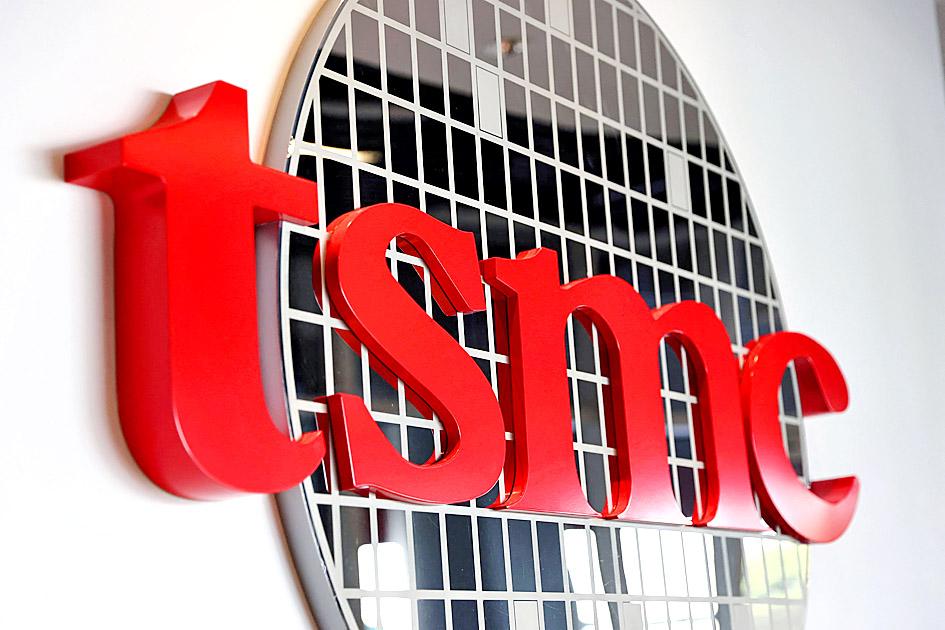Taiwan Semiconductor Manufacturing Co (TSMC, 台積電) yesterday said that its board of directors approved a proposal to subsidize employees’ purchases of TSMC shares by covering 15 percent of investments, the chipmaker’s latest effort to recruit and retain talent.
Employees of TSMC and its fully owned subsidiaries would be allowed to allocate 15 to 20 percent of their monthly salary for share purchases, based on a company employee stock purchase plan, the chipmaker told the Taipei Times.
The plan is to take effect in August or September, it said.

Photo: Ann Wang, Reuters
The board also approved the distribution of a cash dividend of NT$2.75 per share for last quarter, the same as the dividend for the previous four quarters.
That represented a payout ratio of 35.17 percent based on the firm’s earnings per share of NT$7.82 in the quarter ended on March 31.
The board also approved capital appropriations of about US$16,757.67 million to install or upgrade advanced technology capacity, install mature and specialty technology capacity, as well as install or upgrade advanced packaging capacity.
The capital would also be used to capitalize leased assets, it said.
TSMC has budgeted record capital expenditure of US$40 billion to US$44 billion this year, primarily for advanced processes, including 2-nanometer and 3-nanometer technologies.
Separately, TSMC has informed customers of a 6 percent price hike for next year, reports said.
TSMC usually does not comment on pricing.

SELL-OFF: Investors expect tariff-driven volatility as the local boarse reopens today, while analysts say government support and solid fundamentals would steady sentiment Local investors are bracing for a sharp market downturn today as the nation’s financial markets resume trading following a two-day closure for national holidays before the weekend, with sentiment rattled by US President Donald Trump’s sweeping tariff announcement. Trump’s unveiling of new “reciprocal tariffs” on Wednesday triggered a sell-off in global markets, with the FTSE Taiwan Index Futures — a benchmark for Taiwanese equities traded in Singapore — tumbling 9.2 percent over the past two sessions. Meanwhile, the American depositary receipts (ADRs) of Taiwan Semiconductor Manufacturing Co (TSMC, 台積電), the most heavily weighted stock on the TAIEX, plunged 13.8 percent in

A wave of stop-loss selling and panic selling hit Taiwan's stock market at its opening today, with the weighted index plunging 2,086 points — a drop of more than 9.7 percent — marking the largest intraday point and percentage loss on record. The index bottomed out at 19,212.02, while futures were locked limit-down, with more than 1,000 stocks hitting their daily drop limit. Three heavyweight stocks — Taiwan Semiconductor Manufacturing Co (TSMC, 台積電), Hon Hai Precision Industry Co (Foxconn, 鴻海精密) and MediaTek (聯發科) — hit their limit-down prices as soon as the market opened, falling to NT$848 (US$25.54), NT$138.5 and NT$1,295 respectively. TSMC's

TARIFFS: The global ‘panic atmosphere remains strong,’ and foreign investors have continued to sell their holdings since the start of the year, the Ministry of Finance said The government yesterday authorized the activation of its NT$500 billion (US$15.15 billion) National Stabilization Fund (NSF) to prop up the local stock market after two days of sharp falls in reaction to US President Donald Trump’s new import tariffs. The Ministry of Finance said in a statement after the market close that the steering committee of the fund had been given the go-ahead to intervene in the market to bolster Taiwanese shares in a time of crisis. The fund has been authorized to use its assets “to carry out market stabilization tasks as appropriate to maintain the stability of Taiwan’s

In a small town in Paraguay, a showdown is brewing between traditional producers of yerba mate, a bitter herbal tea popular across South America, and miners of a shinier treasure: gold. A rush for the precious metal is pitting mate growers and indigenous groups against the expanding operations of small-scale miners who, until recently, were their neighbors, not nemeses. “They [the miners] have destroyed everything... The canals, springs, swamps,” said Vidal Britez, president of the Yerba Mate Producers’ Association of the town of Paso Yobai, about 210km east of capital Asuncion. “You can see the pollution from the dead fish.